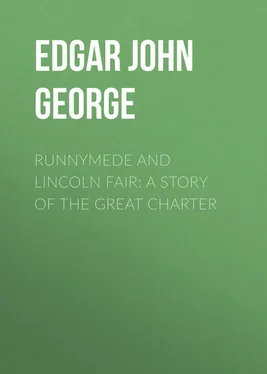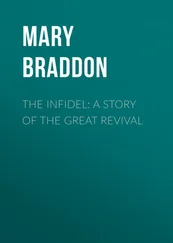John Edgar - Runnymede and Lincoln Fair - A Story of the Great Charter
Здесь есть возможность читать онлайн «John Edgar - Runnymede and Lincoln Fair - A Story of the Great Charter» — ознакомительный отрывок электронной книги совершенно бесплатно, а после прочтения отрывка купить полную версию. В некоторых случаях можно слушать аудио, скачать через торрент в формате fb2 и присутствует краткое содержание. Жанр: foreign_antique, foreign_prose, на английском языке. Описание произведения, (предисловие) а так же отзывы посетителей доступны на портале библиотеки ЛибКат.
- Название:Runnymede and Lincoln Fair: A Story of the Great Charter
- Автор:
- Жанр:
- Год:неизвестен
- ISBN:нет данных
- Рейтинг книги:3 / 5. Голосов: 1
-
Избранное:Добавить в избранное
- Отзывы:
-
Ваша оценка:
- 60
- 1
- 2
- 3
- 4
- 5
Runnymede and Lincoln Fair: A Story of the Great Charter: краткое содержание, описание и аннотация
Предлагаем к чтению аннотацию, описание, краткое содержание или предисловие (зависит от того, что написал сам автор книги «Runnymede and Lincoln Fair: A Story of the Great Charter»). Если вы не нашли необходимую информацию о книге — напишите в комментариях, мы постараемся отыскать её.
Runnymede and Lincoln Fair: A Story of the Great Charter — читать онлайн ознакомительный отрывок
Ниже представлен текст книги, разбитый по страницам. Система сохранения места последней прочитанной страницы, позволяет с удобством читать онлайн бесплатно книгу «Runnymede and Lincoln Fair: A Story of the Great Charter», без необходимости каждый раз заново искать на чём Вы остановились. Поставьте закладку, и сможете в любой момент перейти на страницу, на которой закончили чтение.
Интервал:
Закладка:
John G. Edgar
Runnymede and Lincoln Fair: A Story of the Great Charter
INTRODUCTION
Runnymede and Lincoln Fair was the last story drawing upon the wars and great affairs of English history which its author was destined to write. Like Cressy and Poictiers , which is already included in “Everyman’s Library,” and which preceded it by some three years in its original issue, it first ran as a serial through the magazine particularly associated with Edgar – the Boys’ Own Magazine ; it was first published as a separate book in 1866.
Some further particulars of the brief career of its writer may be added to what has already been told of him in the earlier volume. John George Edgar was the fourth son of the Rev. John Edgar of Hutton in Berwickshire, who was said to be a representative of the ancient family of Edgar of Wedderlie, settled for ages in the parish of Westruther in that county. There seems to be some disagreement as to the date of his birth. The Gentleman’s Magazine for 1864 and Cooper’s Biographical Dictionary give it as 1834, but James Hannay in Characters and Criticisms , published in 1865, says that Edgar was born in the year 1827. From Edgar’s literary record and subsequent career one is inclined to believe the latter version the more correct; and to further quote Hannay: “He was educated at Coldstream school under a man of good local reputation, Mr. Richard Henderson, and the Latin he acquired there proved of great value to him afterwards, in reading the old mediæval chronicles. He went to a commercial situation in Liverpool in 1843; and in 1846 left Liverpool for the West Indies, where he remained till 1848. Returning to Liverpool in the last-mentioned year, he resumed his Liverpool duties till 1852, when he settled in London.”
Thenceforward Edgar deserted commerce and devoted himself to literature, and in little more than ten years he wrote some sixteen volumes, intended mainly for the reading and entertainment of boys. He was the first editor of Every Boy’s Magazine , and its constant contributor. Nor was that the only periodical to which he contributed; we find his name in other journals, and he occasionally wrote political articles, from a typically conservative point of view; but, as Hannay says, Edgar was always “rather a writer of books than a journalist. He studied his subjects for their own sake, and then made what literary use he could of them; but he was little interested in the general pursuits of the literary world proper, and profoundly indifferent to the arts by which literary advancement is sometimes pursued there. Indeed, his appearance in the modern metropolitan world of wags and cynics and tale-writers had something about it that was not only picturesque but unique. He came in among those clever, amusing, and essentially modern men like one of Scott’s heroes. Profoundly attached to the feudal traditions, – a Tory of the purest Bolingbrokian School, as distinct from the Pittite Tory or modern Conservative, and supporting these doctrines with a fearless and eccentric eloquence, to which his fine person and frank and gallant address gave at once an easy and a stately charm, – he represented in London the Scot of a past age… He made serious preparation for a book on the barons’ war, in which he was to take the side of the English monarchy, and which would have certainly exhibited admirable knowledge, and talents for investigation and description, that must have commanded an attention which his previous performances had been too modest even to desire to invite.”
Edgar died of congestion of the brain on April 15, 1864, and his remains lie buried in Highgate Cemetery.
That an author of so much power and promise should have had to end there, half-way, at that comparatively early age, is the more to be lamented, because it was due to the physical carelessness which often wrecks men to whom nature has given a splendid constitution. According to Hannay, Edgar presumed too much on his strength: “He thought it would fight him through anything, so after a bout of solitary literary labour, during which he had lived more suo upon tea and tobacco, he was attacked with brain fever. He would not believe it serious, nor would he send for advice till it was too late.”
When Edgar wrote Runnymede and Lincoln Fair , he filled a gap in English historical fiction. Scott had left the period untouched, and Shakespeare, as a dramatist, had naturally preferred to dwell on the deeds and characters of individuals, rather than on the political controversies of John and his subjects.
Yet the thirteenth century is one of the most important and interesting periods in English history; but it was not an age of chivalry and romance, and this must be borne in mind when we are obliged to admit that Runnymede and Lincoln Fair does not rank so high as Cressy and Poictiers as a work of fiction. Moreover, there is no contemporary chronicler so vivacious and romantic as Froissart for the novelist to draw upon.
The historical literature of the time of Magna Charta is largely monastic, and Edgar follows pretty closely the chronicles of Roger of Wendover and his editor and continuator, Matthew Paris, who was the greatest of the thirteenth-century chroniclers. But he has drawn on various sources besides, among which are the Memoriale of Walter of Coventry, the annals of Waverly, Dunstable, and other monasteries, the chronicle of Ralph of Coggeshall, a full and important chronicle giving many details. For the description of London which Edgar made use of to such advantage he was indebted to The Life of Thomas à Becket by a twelfth-century writer, William Fitzstephen.
The hero of the tale, Oliver Icingla, in so far as being the descendant of Saxon chiefs, and of the house of De Moreville, gives us the keynote of the period – the amalgamation of the two races, Saxon and Norman, to form an English nation. Towards the close of the twelfth century a new language began to be formed, a blending of Anglo-Saxon and Norman; and by the end of the thirteenth century the last manifest difference of race, the distinctive peculiarities of dress, had passed away. But in character Icingla does not represent this fusion of the races. He does not join the united barons and English people in the struggle for national freedom, but appears as a champion of the royal cause; and later, of England against the foreigners.
One cannot help perceiving, as one reads the story, that the sympathy of the author is chiefly with the crown. Walter Merley is the only Norman noble of the king’s adversaries whom he would have us admire. This is also the tone of Roger of Wendover, who calls the leaders of the barons “the chief promoters of this pestilence.” Yet according to Matthew Paris, who is very fair and just, with all his enthusiasm, the barons were not all rogues. He gives the following incident which Edgar has omitted in connection with the siege of Rochester: – “One day during the siege of Rochester Castle, the king and Sauvery were riding round it to examine the weaker parts of it, when a crossbowman in the service of William d’Albini saw them, and said to his master, ‘Is it your will, my lord, that I should slay the king, with this arrow which I have ready?’ To this William replied, ‘No, no; far be it from us, villain, to cause the death of the Lord’s anointed.’ The crossbowman said, ‘He would not spare you in a like case.’ To which the knight replied, ‘The Lord’s will be done. The Lord disposes events, not he… This circumstance was afterwards known to the king, who, notwithstanding this, did not wish to spare William when his prisoner, but would have hung him had he been permitted.”
In the opening chapters of his story Edgar gives an idea of the turbulent state of the country just after the battle of Bouvines – the defeat to which, according to the historians, England owes its Magna Charta. The barons had now the upper hand. John was crestfallen, and “concealed his hatred of the barons under a calm countenance,” says Matthew Paris.
Читать дальшеИнтервал:
Закладка:
Похожие книги на «Runnymede and Lincoln Fair: A Story of the Great Charter»
Представляем Вашему вниманию похожие книги на «Runnymede and Lincoln Fair: A Story of the Great Charter» списком для выбора. Мы отобрали схожую по названию и смыслу литературу в надежде предоставить читателям больше вариантов отыскать новые, интересные, ещё непрочитанные произведения.
Обсуждение, отзывы о книге «Runnymede and Lincoln Fair: A Story of the Great Charter» и просто собственные мнения читателей. Оставьте ваши комментарии, напишите, что Вы думаете о произведении, его смысле или главных героях. Укажите что конкретно понравилось, а что нет, и почему Вы так считаете.












